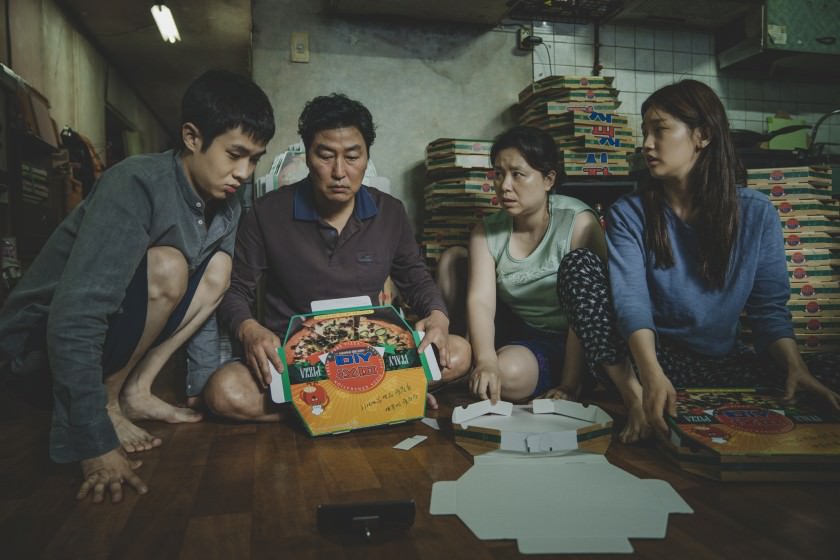Parasite
“There is a lot of extreme emotion in Korean film. It’s because there are a lot of extremes in Korean society.” ~Bong Joon-hoThe tone of the South Korean film Parasite is set in the movie’s first scene, wherein the Kim family, so poor that they literally live underground, are frustrated that they can’t find a neighbor from which to score free Wi-Fi service on their phones—until they do. Like resilient insects, the bottom dwellers live off the resources and residue of others, with no guilt or second thoughts. The only beings lower on their rung are the actual bugs/parasites infiltrating their living space.
 After the preachy, ham-handed political messages of the last film I’d seen by Joon-ho, Snowpiercer (2013), my expectations for Parasite weren’t high, but any “messages” in the film take a back seat to the movie’s most valuable asset: suspense. Parasite makes the audience want to know what happens next, a universal test for any film. Longtime Joon-ho collaborator Song Kang-ho (also a star of one of my favorite South Korean films, Secret Sunshine, 2007) plays the family’s patriarch of sorts, Ki-taek, a joyful conman ringleader. His wife, Chung-sook (Jang Hye-jin), is made of the same immoral cloth. Like parents, like children: Ki-woo (Choi Woo-shik) and Ki-jeong (Park So-dam) are a brother and daughter you wouldn’t want near your fine silver.
After the preachy, ham-handed political messages of the last film I’d seen by Joon-ho, Snowpiercer (2013), my expectations for Parasite weren’t high, but any “messages” in the film take a back seat to the movie’s most valuable asset: suspense. Parasite makes the audience want to know what happens next, a universal test for any film. Longtime Joon-ho collaborator Song Kang-ho (also a star of one of my favorite South Korean films, Secret Sunshine, 2007) plays the family’s patriarch of sorts, Ki-taek, a joyful conman ringleader. His wife, Chung-sook (Jang Hye-jin), is made of the same immoral cloth. Like parents, like children: Ki-woo (Choi Woo-shik) and Ki-jeong (Park So-dam) are a brother and daughter you wouldn’t want near your fine silver.
As Parasite begins, the family can’t even build pizza boxes correctly for the little money that job brings (they take folding short-cuts). Ki-woo is then given an offer by a better-off friend and university student, Min-hyuk: continue tutoring English to Min-hyuk’s romantic interest, Park Da-hye (Jung Ji-so), while Min-hyuk studies abroad. To pull this off, Ki-woo convinces the extraordinarily rich Park family that he’s also a university student. Meeting and negotiating with the somewhat naive Park matriarch, Choi Yeon-gyo (Cho Yeo-jeong), Ki-woo’s entrance into the Park family and their elegant, beautiful and large suburban home—practically a character in the film—presents him with a whole new world of resources to take, use and exploit, including Min-hyuk herself.
Suspense dramas are a minefield of spoilers and Parasite can’t be adequately described without stealing away the film’s audience’s experience of discovery. It’s enough to state that Ki-woo finds ways to get his entire family involved in his new venture and that one of his obstacles to exploitation, the Park’s housekeeper, Moon-gwang (Lee Jung-eun) is potentially even more resilient and resourceful than the Kim family at their best/worst.
Parasite, among many other awards, won the Academy Award for Best Picture, the first film not in the English language to do so. Was Parasite the best film of 2019? Probably not. The film is similar, in many plot aspects, to the previous year’s Palme d’Or winner, Shoplifters (a film I gave my highest rating to), a Japanese film about another impoverished family stealing to get by. Shoplifters is the superior movie, more subtle and emotionally resonant. It’s perhaps an unfair comparison in this respect, though: whereas Shoplifters is a drama, Joon-ho’s film is a warped crime drama mixed with wicked comedy, veering into horror movie territory in its over-the-top violent denouement.
Much has been made on both sides of the political aisles about the film’s “class warfare” theme. Dissecting and analyzing ideologically critical takes on popular culture would entail an entirely different—and much longer—essay, but it’s safe to simply say that to a hammer, everything looks like a nail. Both John Birch and Karl Marx could undoubtedly find political undercurrents and fodder in a shopper’s grocery list, but sometimes a bag of Bugles is just a bag of Bugles. I find the politicization of every form of human communication and interaction, from whatever ideological perspective, to be, at heart, anti-art and anti-human. Parasite certainly has a perspective on class differences, but it’s not absolute. The Parks aren’t evil people, just rich (and naive). If the Kims had applied their ingenuity and creativity to a legitimate enterprise instead of con jobs, folding pizza boxes would have been a thing of their past. It’s a fallacy that characters in fiction need symbolize all the people of their supposed “type”; Joker doesn’t represent all single, lonely men—he represents Joker. The Parks don’t represent all rich families—rich families are as morally varied as any others. The Kims don’t represent all poor people. I believe they represent only their cretinous selves.
—Michael R. Neno, 2/11/2020